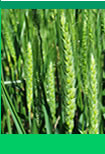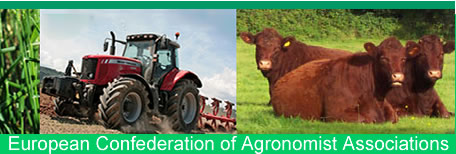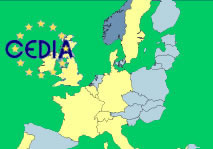| |
CEDIA
Meeting Brussels 14th-15th December 2006
CEDIA Seminar
and Exchange of views, with representatives of the various EU Institutions,
Brussels, and a Representative of the Belgian Farmers organisation,
Boerenbond.
Venue:
Louvain Institute For Ireland In Europe, Louvain, Belgium
Present:
CEDIA Representatives from;
- Belgium
- Cyprus
- Denmark
- France
- Greece
- Ireland
- Italy
- Northern
Ireland
- Portugal
This meeting
was held in conjunction with a CEDIA Board Meeting and gave delegates
an opportunity to discuss developments in Community Agricultural
Policy and the wider issues at European Union Level of Interest.
An opportunity was also taken to visit the European Parliament.
The following
items were discussed:
1.
Developments with regards the European Constitution and
consequential changes to Community Institutional arrangements;
Dr. Margaret
Malone a specialist in the European Constitution was facilitator.
The institutions and the decision make processes of the EU were
discussed, in particular the constitutional changes which were initiated
to facilitate improving the decision making process in the context
of the Nice Treaty, and the main proposals contained in the proposed
Constitutional Treaty for Europe 2004.
Proposals discussed included:
- A
President for the European Council
- A
New European Minister for Foreign Affairs
- European
Parliament – (750 Seats)
- Council
of Ministers (co-decision expanded)
- Team
Presidencies
- Voting
- Increase in and simplified system of voting (55% MS plus 65%
European Population)
- Commissioners
(Reduction in Commissioners – only two thirds of member
states represented by a commissioner from 2014
- An
enhanced scrutiny role for national parliaments in EU Law
The overall
objective being increased, efficiency, democracy and transparency.
Reference:
http://www.europa.eu
Enlargement
of European Union.
Presentation followed by discussion: Catherine Combette (DG Agriculture,
Unit for Enlargement). Topics addressed:
- Immediate
Enlargement - Romanian and Bulgaria (2007), Croatia, Western Balkans,
Turkey further in the future
- “The
European Neighbourhood” which includes Belarus, Ukraine,
Algeria and Morocco
- Criteria
for EU membership
- Progress
with the various applications
- Pre accession
projects (e.g.. IPARD)
2.
CAP Policy Developments
Presentation and discussion - Danielle Bianchi member of Cabinet
of Commissioner Fischer Boel
Topics addressed
- 2003 Review/Single
Farm Payments, cross compliance as well as
- Protection
of the Environment
- Public
Health
- WTO
Trade Issues
- CAP Health
Check 2009
Process to start in 2007 (first a listening period with main discussion
being initiated in 2008) Issues include :-
- Completion
of the 2003 reforms
- Modulation
- transfers from pillar one to pillar two
- Rates
of payment and basis of SFP e.g. per farm/ per hectare rather
than on historical production?
- Future
re Market Organisation
- Future
re Intervention, Milk Quotas, aids to private storage, set
aside
- Financing
of community budget and especially that of CAP
- Common Organisation
of the Market
- Reduction
of COM’s from 21 to 1
- Harmonisation
of rules re commodities
- Re-Launch
of debate on the Constitution - may have a negative Impact on
CAP
- No updates
on objectives of Treaty have taken place since 1957, (Rural
Development, Quality, Animal Welfare not included)
- Greater
use of co-decision (Council and Parliament) procedure in adaptation
of legislation (a step toward a more democratic process?)
3.
Rural Development Policy and Programmes
Presentation
and discussion: Josefine Loriz-Hoffman, DG Agriculture - Head of
Unit for Rural Development Programmes.
Issues discussed included:
- Rural Development
Policy 2007 – 2013
- Challenges
facing Rural areas (Socio Economic, Environmental, Enlargement
Implications).
- CAP Policy
History (changes in support mechanisms etc)
- Policy Implications,
of various initiatives e.g. Nice and Gothenburg Treaties, and
the Salzburg Conference on Rural Development
The Core objectives
of Rural Development policy were identified as:
- Improving
competitiveness,
- Enhancing
the environment,
- Improving
quality of life/diversity of economic activity.
The Programme consists of three axis, to include; Training, Land
Management, Off Farm Diversification plus the Leader initiative
The
Leader Initiative 2007-2013 period (Area based
and bottom up approach)
It was noted
that:
- While a
fund of 90 Billion was requested the final funding agreed was
69 Billion Euros.
- Financial
procedures were streamed lined to include one joint management/
financial control programme system
- Member states
provide National Strategic plans with targets and indicators.
4. Food Safety /Health (GMO’S, Food Safety, Imports/Labelling/Traceability
Mr Michael Scannell
discussed the background and community initiatives to address food
safety issues. This included discussion and exchange of views on
the introduction of new community legislation, the establishment
of the European food safety Authority, new internal arrangements
(e.g. DG SANCO established) and procedures e.g. food and feed management
committee, as well as revised arrangements with countries exporting
food and feed to EU. Detailed discussion took place with respect
to GMO’S. e.g. implications for EU animal production of EU
delays / failure to approve popular GM varieties approved and grown
in the US and South America, when also approved by the EU food safety
authority.
5. 2008
CAP Review Objectives
Jerzy Glucksman
DG Agriculture (Information &Communications officer)
The Objectives of the review were identified as (to examine/address
post 2013):
- Cost / Sustainability
- Simplification
- Distribution
of support
It was noted
that CAP accounted for 42% of EU budget.
Models for decoupling,
current support mechanisms to include the options/ hybrids currently
in operation in various member states, as well as possible future
arrangements, were discussed. It was noted that total decoupling
with no derogations was only in operation in Ireland, Scotland and
Wales. Full decoupling was expected to be generally achieved in
other member States, most likely by 2009/10. Entitlements/SFP cross
compliance and set a side would also to be reviewed. The continued
acceptance by society of the CAP budget and direct payments to farmers
could be an issue? Future of intervention, quotas, set a side –
most likely to be discontinued; – termination of most export
refunds agreed to take place by 2014.
6. Environmental
issues – to include Reps/Nitrates etc
Michael Hamill DG Agriculture
The nitrates/
soil Directives / water pollution and Reps were discussed. It was
noted that this directive was agreed in 1991 following huge eutrification
in European waters to include the Adriatic, Mediterranean, Baltic
seas etc generally accepted as arising from Nitrogen and Phosphate
pollution. Sources included untreated wastewater (domestic and industry)
and agricultural which was more insidious. The strategy adopted
to address these problems to include monitoring and individual country
approaches and programmes were outlined. Nutrient management plans;
rates and times of application; manure and slurry storage and handling
arrangements were discussed.
Developments with respect to the European Union water framework
Directive, the proposed Soils Directive and Reps 4 were outlined.
7. The Future of Agriculture in the context of CAP and World
Trade.
Klass Dam – economic Adviser for Boerenbond (Belgian Farmers
union)
The main issues discussed were:
- EU financial
perspectives/ Government support for CAP.
Issues discussed included:
- The
influence of enlargement and decoupled payments (EU Pop increased
to 454 millions, farmers by 57% to 11 millions, and agricultural
area by 28%, employment in Agriculture in EU 25 to 5.4%)
- EU expenditure
(less than 1% of all EU public expenditure goes to CAP, compared
to 2/3% for NATO defence).
- Contribution
of CAP (Multi functionality -food security & quality and
safety, Environmental protection, animal welfare, sustainability
of rural communities
- Need
to better sell the image of farming to the public.
- Market Outlook
Outlook was regarded as positive with particularly good prospects
for cereals and milk products
- WTO
- Main discussion
areas re agriculture:
Domestic support, Market access (tariffs), Export refunds, - the
three main pillars of the negotiations, as well as Export credits,
State trading enterprises, special safeguard mechanisms for developing
countries, Food Aid, and sanitary and phytosanitary issues.
Details were provided re timing and scale of the tariff and trade
distorting domestic support reductions proposed and arrangements
for sensitive products. The possibility of green box payments
being challenged as having trade distorting effects even when
support was provided through policies that decouple subsidies
from production, together with its
implications for EU, was also discussed.
8) Continuous
professional Development (CPD)
Andrew Stewart (NIIAS & chairman Agrilink)
Details of
a EU funded Interreg project was outlined. This included a survey
of the training requirements of agricultural graduates in the North
and South of Ireland in the context of continuous professional development
as well as an online tool developed to assist graduates with their
own specific personal development programme.
Note: Dr Dermot Ruane President of ASA, and Sean Gaule
representative of ASA to CEDIA attended.
Presidency Running Order 2007 to 2020
- Germany
Jan – June 2007
- Portugal
July – Dec 2007
- Slovenia
Jan – June 2008
- France July
– Dec 2008
- Czech Rep
Jan –June 2009
- Sweden July
– Dec 2009
- Spain Jan
– June 2010
- Belgium
July – Dec 2010
- Hungary
Jan –June 2011
- Poland July
– Dec 2011
- Denmark
Jan –June 2012
- Cyprus July
– Dec 2012
- Ireland
Jan –June 2013
- Lithuania
July – Dec 2013
- Greece Jan
– June 2014
- Italy July
– Dec 2014
- Latvia Jan
– June 2015
- Luxembourg
July – Dec 2015
- Netherlands
Jan – June 2016
- Slovakia
July – Dec 2016
- Malta Jan
– June 2017
- UK July
– Dec 2017
- Estonia
Jan –June 2018
- Bulgaria
July –Dec 2018
- Austria
Jan –June 2019
- Romania
July –Dec 2019
- Finland
Jan – June 2020
Posted by Sean
Gaule
|


